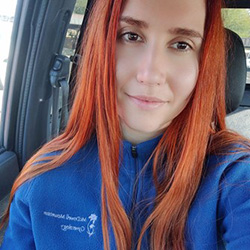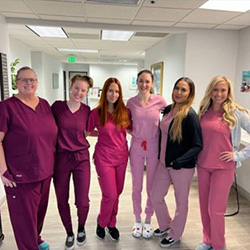White Coat Profile: Mirela Ananieva
The White Coat Ceremony marks the first time a medical student will don his or her white coat, the defining symbol of a physician. The coat bestows a great honor on each student, and with it comes a responsibility to uphold the trust of every patient they will encounter. The Class of 2027 will receive their white coats on July 14 during a ceremony that begins at 3:30 p.m. in the West Ballroom of the Phoenix Convention Center downtown.
Meet Mirela Ananieva

Preventive care and wellness have always been Ananieva’s passion; diet is an integral part of a person’s well-being and one of the greatest tools to improve long-term health outcomes.
Nevertheless, working with patients highlighted how limited nutrition is in providing comprehensive patient care. This inspired Ananieva to become a physician and combine her nutrition background with medicine to best help patients.
As an immigrant and the first physician in her family, her biggest supporters have always been her mother, father and little sister, all of whom taught her everything she knows about the importance of hard work and perseverance.
Path toward Medicine
What was the spark that led you to become a physician?
My decision to become a physician began with a cup of tea. Growing up, herbal remedies were a cultural staple in my household. On one sleepless evening, my mother set a steaming cup in front of me and explained that the compounds found in chamomile can help me fall asleep. With that began my interest in biochemistry and nutrition.
However, as I progressed in my dietetics career, I found myself wanting the knowledge and ability to treat patients in a greater capacity. Although nutrition is an invaluable tool for preventing and even managing certain health conditions, it has many limitations. Creating therapeutic diets for patients always left me wanting to learn more about their conditions and understand how to continue their care.
I began working as a medical assistant to familiarize myself with different areas of health care. Each experience fed my curiosity and reinforced my love for the practice of medicine. The privilege to care for patients in their most vulnerable moments inspired me to do everything I can to improve their quality of life. As I begin my studies at the College of Medicine – Phoenix, I look forward to applying my dietetics background toward that goal.
Did you do any volunteering in health fields prior to medical school?
I volunteered at many local hospitals and clinics throughout college. I started as a volunteer at St. Joseph’s Hospital in Phoenix, where I was responsible for transporting patients around the hospital and communicating with their families in the operating rooms. Although it did not require significant clinical involvement, it was very rewarding to see how even a simple conversation could vastly improve a patient’s or family member’s day.
As I began to learn more about the social and cultural aspects of diet and health, I became more involved in public health education. My goal was to make healthy lifestyles more accessible through culturally and financially sensitive education. I volunteered as an educator at underfunded elementary schools and homeless shelters.
For my graduate applied project, I partnered with the University of Arizona College of Medicine – Phoenix medical students to create a diabetes self-management program for patients with uncontrolled hyperglycemia at the Wesley Community and Health Center.
The College of Medicine – Phoenix
Why did you choose the College of Medicine – Phoenix?

The college not only has an incredibly supportive faculty, but also a program that is structured to challenge and encourage its students. I admire the integration of the Scholarly Project, as well as the many programs and interest groups dedicated to serving underprivileged urban communities — a cause that I am very passionate about.
Above all else, my experiences with the College of Medicine – Phoenix community have shown me that this is an environment where I can thrive and become the best possible physician!
What excites you most about beginning medical school?
I am excited to delve into the topics and material that have interested me for so long. The road to medical school has been long, but worthwhile. I am proud to see all the late nights, empty coffee cups and canceled plans pay off as I begin my journey toward my dream career.
It is a true honor and privilege to be in this position, and I am really looking forward to seeing where this new path takes me!
Significance of the White Coat
What does the white coat mean to you?
To me, the white coat is an accomplishment. More importantly, it is a symbol of a promise. It has taken years of hard work to be given the opportunity to study medicine.
This coat serves as a reminder of the road that led me here and a glimpse of the road still ahead. By putting on this white coat, I am committing myself to a life of service in the field of medicine and a promise to always put my future patients first.
About the College
Founded in 2007, the University of Arizona College of Medicine – Phoenix inspires and trains exemplary physicians, scientists and leaders to advance its core missions in education, research, clinical care and service to communities across Arizona. The college’s strength lies in our collaborations and partnerships with clinical affiliates, community organizations and industry sponsors. With our primary affiliate, Banner Health, we are recognized as the premier academic medical center in Phoenix. As an anchor institution of the Phoenix Bioscience Core, the college is home to signature research programs in neurosciences, cardiopulmonary diseases, immunology, informatics and metabolism. These focus areas uniquely position us to drive biomedical research and bolster economic development in the region.
As an urban institution with strong roots in rural and tribal health, the college has graduated more than 1,000 physicians and matriculates 130 students each year. Greater than 60% of matriculating students are from Arizona and many continue training at our GME sponsored residency programs, ultimately pursuing local academic and community-based opportunities. While our traditional four-year program continues to thrive, we will launch our recently approved accelerated three-year medical student curriculum with exclusive focus on primary care. This program is designed to further enhance workforce retention needs across Arizona.
The college has embarked on our strategic plan for 2025 to 2030. Learn more.